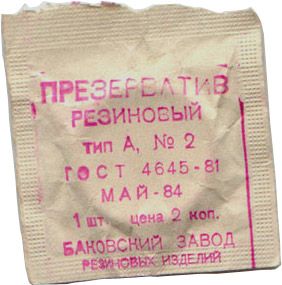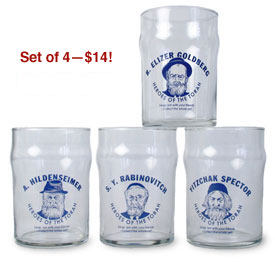To celebrate my 2 year anniversary of working for Fast Company and Inc magazines, I decided to write 2 posts about entrepreneurship. Here’s the first one.
The owner of super awesome HMS Beekeeper store recently complained that people told her that she should close “because it’s ‘buy nothing day'”. I’m pretty sure that these people would have enjoyed my childhood in the Soviet Union, where most days were ‘buy nothing day’. Soviet Union was the kind of place where reporting your father to the secret police could make you a national hero, while engaging in business activity was a crime.
I was brought up in an environment where 99% of non-governmental commercial activity was outright illegal, and the allowed kind was considered extremely unwholesome by association. Just about any item produced by the Soviet industry would be stamped with a price in order to discourage illegal arbitrage, like this condom, for example:

These days outside of California it’s hard to imagine a society that considers this much commercial activity evil, but when I was a kid, any schoolchild caught engaging in commercial activity of any sort could get in a lot of trouble. Personal entrepreneurship was literally a criminal activity. This kind of an environment tended to produce excellent jet fighters, but pretty crummy condoms.
In America entrepreneurs get a lot of respect (outside of government and hippie circles), and they tend to start early. You always read about the likes of Warren Buffet and Bill Gates having business ventures in high school and college.
My former co-worker told me a story about his daughter who got into trouble for her entrepreneurial activities in 2nd grade. She and her friend decided to cash in on the popularity of Webkinz. They went into the business of selling hand-drawn counterfeit Webkinz trading cards. Surprisingly they were able to sell a good deal of those. The trouble came when the teachers noticed that they were engaged in market segmentation and variable pricing (which is a topic of one of my favorite Joel on Software articles). You see, the girls were selling cards at a discount to the popular kids and at inflated prices to unpopular ones.
This episode only increases my dislike of schoolteachers. If I were in their place I would have praised the girls for entrepreneurship, and explained to them that it’s copyright infringement that is problematic, while market segmentation is perfectly kosher, even if a little sneaky. I’d teach them about premium vs generic branding and how some people happily pay a lot more for identical items in different packaging.

